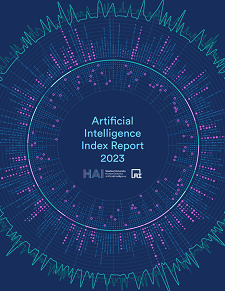Artificial Intelligence Index Report 2023

date: 20/12/2023
The AI Index is an independent initiative at the Stanford Institute for Human-Centered Artificial Intelligence (HAI), led by the AI Index Steering Committee, an interdisciplinary group of experts from across academia and industry. The annual report tracks, collates, distills, and visualizes data relating to artificial intelligence.
The AI Index collaborates with many different organizations to track progress in artificial intelligence. The 2023 report includes new analysis on foundation models, including their geopolitics and training costs, the environmental impact of AI systems, K-12 AI education, and public opinion trends in AI. The AI Index also broadened its tracking of global AI legislation from 25 countries in 2022 to 127 in 2023.
While not as main focus, the report also provides insights into the gender dimension of AI. In 2021, 78.7% of new AI PhD graduates in North America were male and 21.3% were female. While the share of female AI PhDs marginally increased from 2020 to 2021, there has been no significant changes in the last decade relating to the gender distribution of new AI PhDs, so there continues to be a gender imbalance in higher-level AI education.

Examining popular chatbots around mid-2022, researchers at Luleå University of Technology found that out of 100 conversational AI systems analysed, 37% were identified as female. In addition, a notable 62.5% of popular commercial conversational AI systems are female by default, suggesting that companies disproportionately choose to deploy conversational AI systems as female. Critics suggest that this trend results in women being the “face” of glitches resulting from flaws in AI.

